The Missionary Nature of Islam
- Hamza Nasir
- Aug 6, 2024
- 8 min read
Introduction
Some groups consider their way as the best to realize fortune in this life and the Hereafter but do not care to share it with others. Others see their way to be the best to secure happiness for human beings in this life and are ready to compel others to adopt it. There are still others who believe that their way is the only way to secure felicity and peace for human beings in both the temporary world and eternal life. They also care for others as much as they care for themselves. So, they are eager to share their way with others, but without trying to compel anyone.
Muslims belong to the last group. Their religion, Islam, commands them to invite all accountable beings (the jinn and humans) to share Islam with them. Allah SWT says: “Invite to the way of your Lord with wisdom and fair preaching and argue with them in a better way. Truly, your Lord knows best who has gone astray from His path, and He is the best aware of those who are guided.” (Holy Quran 16:125)
Islam is a complete set of beliefs, rituals, laws, and moral values. It invites both the jinn and humans to attain comprehensive peace in this life and the Hereafter. It encourages them to cooperate to achieve maximum happiness in both lives. Peace, as most of us know, means to grant every adult the opportunity to work for his happiness without interference from others, except to try to help him to achieve what he wants or a better one, but without compulsion. This is so because the original rule of dealings between adults is that they are all equals; the relation is not a relation of a guardian to a receiver of guardianship.

Why do Muslims propagate Islam?
Muslims propagate Islam because they are concerned with realizing peace and prosperity for all mankind (and any other accountable beings) in this mundane life and eternal life. There is no stronger evidence that Islam cares for the good of all people. At the same time, Islam considers every adult, male or female, free in this world to make his or her choice of faith, but to expect the consequences of his or her choice in the Hereafter. God Almighty says: “There is no compulsion in religion. Verily, the right path has become distinct from the wrong path.” (Holy Quran 2: 256)
However, when a person chooses to be a Muslim, he enters into a life-long covenant with Allah, and he must commit himself to what Islam has made compulsory to do and abstain from doing what the religion has made prohibited for him. Otherwise, he exposes himself to punishment and will be deprived of the great rewards promised in this life and the Hereafter.
We can compare this to a person who willingly accepts to be a citizen of a certain country. Then, it becomes incumbent on him to abide by the laws of that country. He should do what he is required to, and he gets what he deserves. There is only one big difference between the two; he could be expelled from the country, but no one can deprive a person of being Muslim against his will.
Why are Non-Muslim Missionary Activities not allowed?

Some Islamic countries forbid missionary activities of other faiths or ideologies because of two major reasons:
The majority are Muslims and they have chosen Islam as their way of life, to secure felicity in this life and the life Hereafter. This means:
To believe in a creator for the whole universe, Allah, glorified be He
Allah alone deserves to be worshipped
All creatures can communicate with Him directly.
Allah distinguished the jinn and human beings with abilities, such as reasoning faculty and relative freedom, and provided them with guidance in the form of the natural disposition of man and the Divine messages through God’s messengers. Therefore, they must account for their deeds in this temporary life and reap their fruits in Eternal life, where there is only Paradise or Hell.
The accountable beings (the jinn and humans) must obey the commands of Allah, that is, to do what they are commanded to do and to refrain from what they have been forbidden. Thus, it becomes clear that current religions and ideologies contradict the Islamic religion in one or more principles. Promotion of these religions or ideologies threatens the security of Muslim citizens, not only in this life but also in Eternal life.
2) A great percentage of the citizens are not adults, and the government is responsible for their safety including their fate in Eternal life. Those who live outside their countries, whether they represent themselves or represent their governments, the governments do not prevent them from exposing themselves to alien faiths or ideologies. The adults who are qualified to expose themselves to these religions and ideologies are often helped to study them.
This law is in harmony with the international codes concerning cultural rights, which grant the parents or guardians the right to choose the type of education for their children. Naturally, some governments prevent some activities because, from their point of view, they are dangerous activities that undermine the internal security of the country, even when these activities endanger only the temporary life of the citizens.
This kind of law, which is approved by the ‘democratic’ systems, becomes more critical if these activities endanger not only the temporary life but also the eternal life of the citizens. If these laws do not pose any imminent threat to others, they are in harmony with the Charter of the UN, which emphasizes the independence of its members and protects it.

Aside from the law that prohibits missionary activities, all Muslim countries, one way or another, permit non-Muslims to practice their faiths and to apply their civil laws, provided that these laws are not in sharp conflict with the laws chosen by the majority and do not endanger the security of the country. This common practice by the Islamic countries is derived from Islamic law, which also gives a special status to the area occupied by the Kingdom of Saudi Arabia, the host of the two holiest cities to all Muslims in the world.
Why Not Openly Practice Other Religions in Saudi Arabia?
To discuss this issue, we must establish certain facts. First, to be affiliated with the UN does not mean that the member states should give up their faiths or local laws or traditions, as long as the member does not enforce them on the other nations. Therefore, all nations reserve their rights in these matters, including the ‘democratic’ countries. The Charter of the UN reads: “To develop friendly relations among nations based on respect for the principle of equal rights and self-determination of people, and to take other appropriate measures to strengthen universal peace”. (Article 1:2)
UN charter also says: “Nothing contained in the present Charter shall authorize the United Nations to intervene in matters which are essentially within the domestic jurisdiction of any state or shall require the Members to submit such matters to settlement under the present Charter, but this principle shall not prejudice the application of enforcement measures under Chapter 7"
Secondly, according to the democratic secular principles, the minority cannot impose its laws on the majority. Thirdly, foreigners are not eligible to vote, because they have their rights in their own countries. Their residency in a foreign country is based on a mutual contract between them and the government of the foreign country, which has issued them the visa. No party has the right to demand anything that is not mentioned explicitly or implicitly in the contract after the contract has been signed and all local laws are included under the implicit provisions.
This is to say that before signing the contract each party has the freedom to accept or reject the provisions of the contract, and no party can force the other party to accept its conditions without the other’s consent. So, the foreigner, before accepting the visa, has to weigh the benefits that he will get from entering the country and those conditions, and then decide to accept it or quit.

After concluding the contract, the foreigner has to respect the local values if he enters the country. This is a common practice and a natural one, even among the democratic countries. As examples, we can quote the following:
If a child was born to a foreigner in the USA, his child cannot enter the USA without an American passport, although this may expose this child and his parents to punishment by their own country. However, this child or his guardians can choose not to enter the USA, and no one can force them to do so.
Most countries, if not all, distinguish between different types of visas that have different kinds of restrictions such as student visas, tourist visas, business visas, and so on.
Many Muslim minorities live in non-Muslim countries where they cannot apply some very basic parts of Islamic law. Because Islam is a practical religion, it relieves those Muslims of applying these laws. Among these laws are capital punishment, cutting off the hand of the chief, and lashing adulterers. Islam encourages these Muslims to be good citizens of high moral values.
If this is the case of a citizen who belongs to a minority in his own country, then it is natural for a foreigner to abide by the local laws during his stay in a Muslim country till the termination of the contract. After all, he has the right to choose between entering the country or not, and no government can force him to do so.
Regarding diplomats, the officers are usually of different faiths and sects and change from time to time. Besides, their commitment to their faiths and values ranges from weak to strong. Therefore, they are permitted to practice their faith and to observe their rituals in their private places, which are protected by diplomatic conventions. In addition to that, diplomatic conventions call for mutual respect of the national laws.

The people of the Kingdom of Saudi Arabia, which hosts the Islamic holiest cities in the world, have chosen the Islamic package of laws, and this law prohibits openly practicing two religions in the Arabic Peninsula. Therefore, it is the responsibility of the Saudi government to implement this law. This law also includes the prohibition of non-Muslims’ entry into Mecca, the holiest city in Islam, which Muslims all over the world face when performing their five daily prayers and where they go to perform their pilgrimage.
This is also not unusual because we often run into signs of “no entrance is permitted for the unauthorized” in various buildings. These signs are made for security reasons, to prevent disturbance, or, in the case of Mecca, to protect the sanctity of the Holy City. Therefore, it is natural for the unauthorized people to respect the will of the persons concerned.
Even demanding equal treatment in this matter is a violation of personal freedom. You cannot demand that a person let you in your house because you willingly decided to let him in your house. By doing so, you are neglecting the fact that, in this matter, everyone is free to do what suits his/her circumstances or is comfortable for him/her.
Conclusion
In summary, the Islamic perspective on sharing faith, emphasizes that Muslims believe their way offers peace and prosperity for all. They are commanded to invite others to Islam through wisdom and fair preaching without compulsion, as emphasized in the Quran. Some Islamic countries restrict non-Muslim missionary activities to protect the faith and spiritual well-being of their citizens.
The blog also discusses the prohibition of openly practicing other religions in Saudi Arabia, citing the protection of Islamic laws and traditions, especially in Mecca and Medina. These policies align with international norms, allowing countries to uphold their cultural rights and values. Foreigners entering Islamic countries are expected to respect local laws, especially in countries like Saudi Arabia, which hosts Islam's holiest sites.




Keep up the Amaizing work